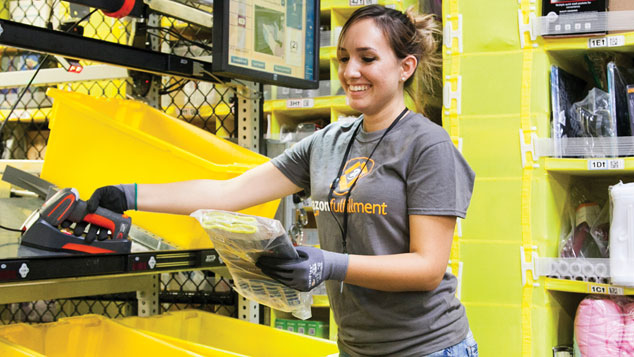
If you hold supermarket shares, watch out, says Alex Williams.
British consumers could soon be buying their bread and milk from Amazon after the group struck a deal with supermarket Wm Morrison this week. The smallest of the “big four” supermarkets, Morrisons will provide fresh and frozen food to Amazon customers, with delivery times in some places of under an hour. Morrisons will gain access to Amazon’s logistics, while Amazon gets an inroad into the UK grocery market, as retailers race to build their online presence. Sainsbury’s bid £1.3bn for Argos’s parent company last month to gain access to its distribution business.
Shares in Tesco and Sainsbury’s, already locked in a price war with Aldi and Lidl, both fell on the news. Amazon’s entry into an already crowded marketplace is a challenge “to the whole trade”, says Shore Capital analyst Clive Black. “Tesco could soon be about to find out what it’s like to be David rather than Goliath.” But hardest-hit was online food retailer Ocado, whose share price slid by 12%. It’s a nasty “wake-up call” for investors who had hoped that Amazon might buy Ocado to gain a foothold in the food market, says Christopher Williams in The Daily Telegraph. “Amazon’s long-awaited attack on the UK’s supermarkets has arrived.”
Amazon, the world’s largest retailer, already delivers fresh food in the US. Founder Jeff Bezos has created a $261bn empire by indefinitely sacrificing profits in favour of market share – a “profitless growth model”. Amazon’s sales more than doubled last year to $318bn, but its net profit margins were lower than 0.6%. “It is hard to keep pace with Jeff Bezos”, says business strategist Philip Delves Broughton in the Financial Times, but groceries are not books.
Amazon is fine at shipping bulky goods, but has had “limited results” on fresh meat, fruit and eggs. Membership of Amazon Fresh was initially free in America, but the company has struggled to find a pricing model and now charges $299 a year.
Morrisons is the only clear-cut winner from this week’s deal, judging by the market reaction. Its shares have risen by 10%, enough to lift the company back into the FTSE 100, after its demotion last year. Chief executive David Potts must wonder whether Amazon will use the partnership to weigh-up the UK market, before jettisoning Morrisons from the deal. But given the state of the supermarket sector, Potts does not have “the luxury of paranoia”, notes Williams. “The partnership is a prize, regardless of Amazon’s secret strategising.”
Gamble of the week
China’s stockmarket turmoil has left retailers reeling. Shopping has lost its lustre and luxury brands in Hong Kong are feeling the pinch. So are their landlords, says the Lex column in the FT. Brands including Burberry are closing or shrinking stores, with high streets the hardest hit. Rents on some leases have fallen by 40%.
Malls have been more resilient, but shares in mall owners have been sucked into the wider sell-off. Hang Lung Properties (HK: 101), one of Hong Kong’s biggest property groups, has fallen by 60% in ten months and the shares are now yielding more than 5%. The firm is benefiting from an expansion in Asia by retailer H&M, which is now its largest occupant, reports the South China Morning Post.
Aberdeen Asset Management, which owns 5% of Hang Lung, says Hong Kong is a safer bet than investing directly in China, where corporate governance is laxer. Hang Lung has expanded rapidly in Shanghai and has secured sites in other Chinese centres, from Jinan to Wuxi, making the shares something of a punt on the short-term trajectory of China.